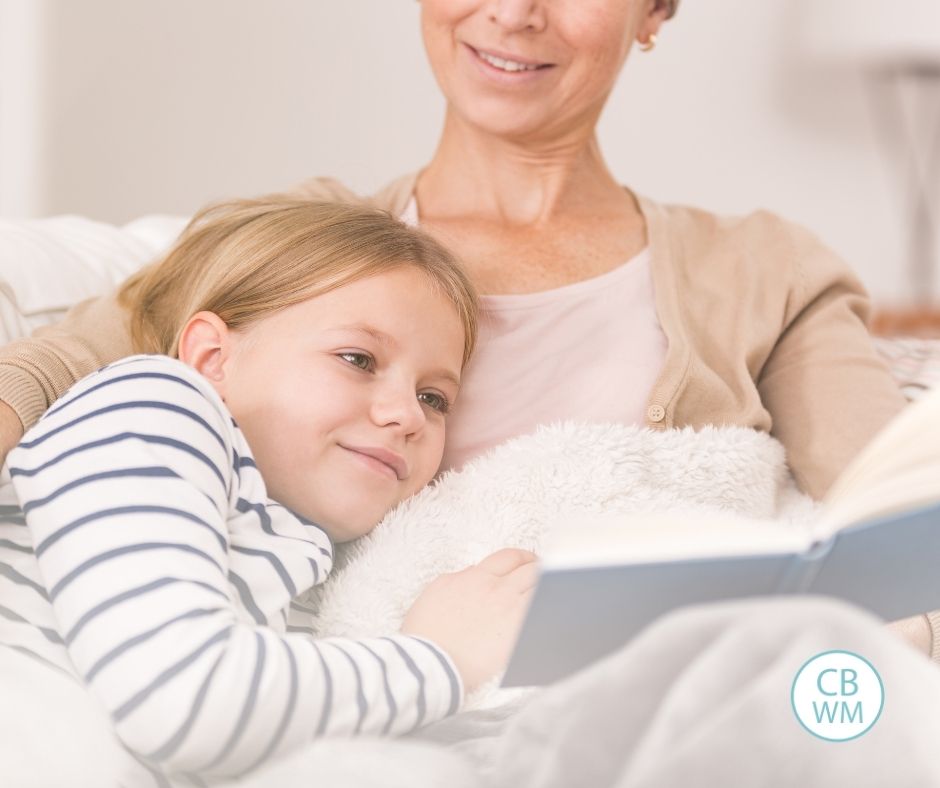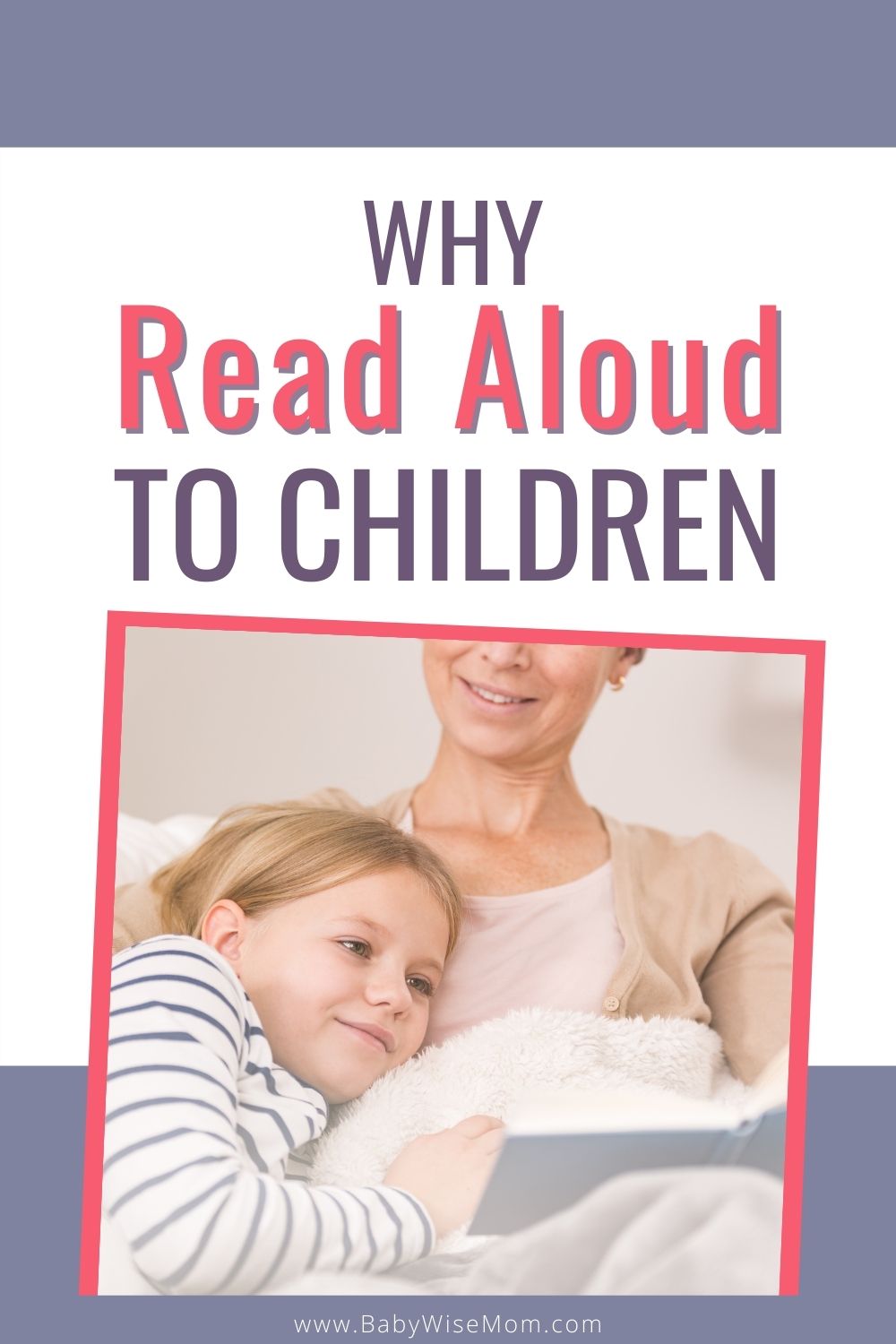Learn the benefits of reading aloud not only to your babies, toddlers, and preschoolers, but big kids, also.

“…every child begins school wanting to learn to read” (The Read-Aloud Handbook
Oh how true this is!
Every child starts school believing they are smart and capable.
Unfortunately for some, it doesn’t take very long at all for them to do the comparing and realize where they stand in the class.
Little kids want to read–and want to read constantly (at least my little kids do). But here are some startling statistics found in the The Read-Aloud Handbook
- 54% of fourth graders read for pleasure each day
- 30% of eighth graders read for pleasure each day
- 19% of twelfth graders read for pleasure each day
As Trelease puts it, “We have 100 percent interest in kindergarten but lose 78% of our potential lifetime readers by senior year” (page 1).
I would personally be interested in seeing the numbers by the end of kindergarten.
Yesterday I was helping in Brayden’s class. The children were passing off reading the words for colors. Some children did it without much effort. Some struggled but didn’t seem to care much.
One girl really struck me. She wasn’t focussing on the paper at all (whether it was a defiance issue or a lack of attention span issue I am not sure). Instead, her eyes would wander over to look out the windows. The thing that broke my heart is that she seemed sad about it–she was visibly uncomfortable with the fact that she couldn’t read.
Reading these words came as no surprise. We were told as parents four months ago that the children would be asked to do this.
No sweat for Brayden. We read through them four months ago and he read them fine so I didn’t worry about it again. However, if I had a child who couldn’t read them, of course I would have been coming up with ways to help the child learn to read them.
I was also saddened because I am 100% positive Kaitlyn could read those words. If she couldn’t, she would at least try to sound them out. This girl couldn’t even give an attempt at “what is the first sound?” This poor girl! This is a girl who will hate reading by fourth grade if she doesn’t already.
“The single most important activity for building the knowledge required for eventual success in reading is reading aloud to children” (page 3).
“The more you read, the better you get at it; the better you get at it, the more you like it; and the more you like it, the more you do it” (page 3).
“The more you read, the more you know; and the more you know, the smarter you grow” (page 3).
So perhaps one reason for the demise of interest in reading aloud to children is that it will help their chances of being good readers in the future. If you think about it, reading is fundamental to any learning process.
I don’t know about you, but I can’t think of any profession that doesn’t require the ability to read and comprehend to get into it. You read text books and instructions. Even trade professions require reading in the training process.
Post Contents
Reading Aloud Prevents Reading Problems from Developing
In Reading Magic, Mem Fox discusses reading problems in chapter three. She says reading problems are hard to fix, but easy to prevent. She also says that prevention happens long before school starts and that the first day is almost too late “Scary as that is” (page 13).
The idea of prevention being ideal makes sense to me. That is a trend we see common in everything from parenting, to dog training, to weeds. The natural question is then how do you prevent reading problems?
You read to your children.
Fox recommends three books a day–one favorite, one familiar, and one new (but that the same story three times in a row is okay, too). She says a child needs to have been read 1000 books before he/she can learn to read. That might sound like a lot, but if you do the math, that is three books a day for just over 333 days, so you could easily say a year of reading three books a day to your child and your child will be ready to learn to read.
Read Aloud at All Ages
But something else happens to children as they get older. Their parents stop reading aloud to them. So most kindergarteners enter school having had their parents read to them most every day to that point. But as children get older and learn to read on their own, parents stop reading aloud to them.
“[Reading aloud] is a practice that should continue throughout the grades”–this is true in the home and at school (page 3).
When I first read this in this book, I was a bit surprised by that concept. Read to your children so long as they are living at home. Isn’t that a huge time commitment? Um, yes. So why would we do that?
Reading aloud does the following (found on page 4):
- Reassures
- Entertains
- Creates a bond
- Informs and explains
- Arouses curiosity
- Conditions the brain to associate reading with pleasure (we are driven by pleasure, correct?)
- Creates background knowledge
- Builds vocabulary: “…the more often a child is read to, the more words are heard…” (page 7).
- Provides a reading role model
Studies have shown that no matter the gender, race, nationality, or socioeconomic background, “Students who read the most also read the best, achieve the most, and stay in school the longest” (page 5).
So being read to aloud into older grades helps children maintain these positive connections to reading.
When I was in elementary, I had a teacher who read aloud to us each day. He was our reading teacher for two years in a row, and he loved Tolkien (by the way, my Dad also loves Tolkien–do you think it is any coincidence that I also love Tolkien?).
When I reached 7th grade, we were suddenly told which books to read. I still read a lot because we were challenged to read more than our assigned books. We set a goal in number of pages each quarter, and each quarter we had to go up. I do well with goals.
But as time went on, I found myself reading only what was required of me in school. I entered college as an English major, and still only read what was required.
As I went on, my literature classes lightened because I was a technical writer. At that point, I started reading for pleasure again. I found the fun–beyond the pressure of tests and coming up with an impressive analysis for the professor.
I can absolutely believe that if I had read aloud during high school, I would have maintained more of a pleasure in reading. At least I still love to read today.
What Motivates People to Read
And why might that be? One study found what motivates children and adults to read:
- They enjoy the experience
- They like the subject matter
- They like and follow the lead of people who read a lot (anywhere from Oprah to Mom)
So reading aloud covers number one. I know for me, both of my parents are avid readers, so it is only natural that I be an avid reader myself.
What Age Should You Start Reading to Your Child?
That is a big question parents ask themselves.
What did I do? I started reading, with all three children, literally from birth. It was something to do and they enjoyed being held and listening to my voice. I plan to do the same with my next child.
I love what Jim Trelease says about this in The Read Aloud Handbook.
He points out that when your child was born, you talked to your baby. You told him how much you loved him and gave him a list of promises. He didn’t speak your language yet, but you still talked to him. You spoke complex sentences.
Trelease says, “If a child is old enough to talk to, she’s old enough to read to. It’s the same language” (page 23).
I love that!
Whatever the age of your child now, don’t feel guilty if you haven’t started reading yet. Just start as soon as you can. Make the effort to start.
Conclusion
In summary, two broad categories of why we read aloud to our children is that it helps them be better readers and it helps them to continue to enjoy reading.
It also does the things in our bulleted list above. It creates a bond with you and your child. It reassures your child. It builds vocabulary and gives background knowledge. It makes your child curious. It sets a positive role model.
“Read to them….It’s that simple. It’s the most important thing a parent can do with their children”
(page 21). emphasis added
Related Posts
- Teaching Children to Love to Read
- How To Improve Reading Skills with Sustained Silent Reading
- This One Simple Thing Will Turn Your Kids Into Readers
- Book Recommendation: The Read Aloud Handbook

